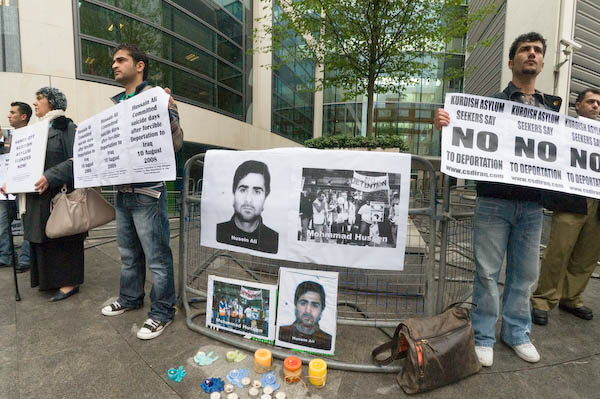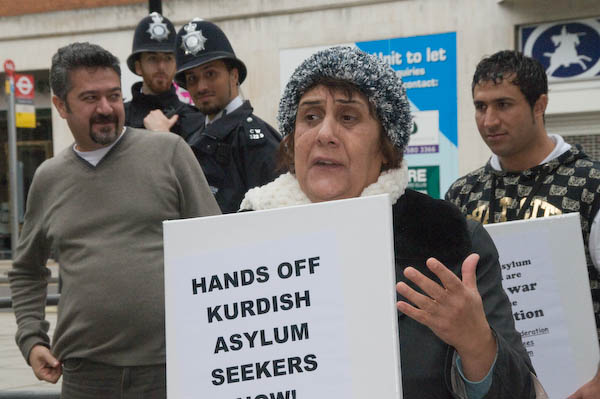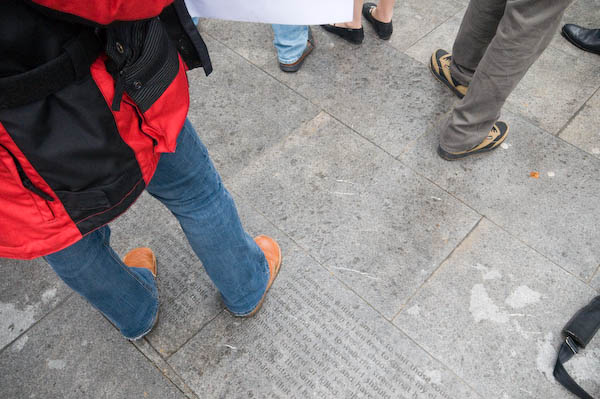Around thirty demonstrators held a lunchtime vigil outside the London Home Office on Thursday 11 Sept, 2008 to oppose the unfair detention and forced removal of Kurdish Iraqi asylum seekers from the UK, which has resulted in an unknown number of deaths.

Some Kurds have accepted voluntary return to Iraq, often forced on them because they are prevented from working in this country and have to rely on charity of friends and a few small groups supporting them.
One of those who eventually signed to go back was Kalir Salih Abdullah, a former fighter of the Patriotic Union of Kurdistan (PUK) who claimed asylum in Britain in 2000, having fled leaving his family of six in Kurdistan. He spent five years pursuing his claim for asylum without success, before desperate circumstances here led him to sign voluntary return papers, and he was returned at the end of March 2005.
In Feb 2006 he was kidnapped outside his home, apparently by the PUK, and his family have since been unable to find out what has happened to him. His teenage daughter, traumatised by his disappearance, committed suicide.
The protest at the Home Office included members of the families of two men who died this August. The UK tried to send the dying Mohammad Hussain back to Iraq after 8 years here this May, but his lawyer made a successful challenge to the order, and he died here on 3 August.
Hussein Ali was forcibly returned to Kurdistan on 7 August this year. Three days later he committed suicide.

Since 2005, this country has forcibly returned around 500 Iraqi asylum seekers to Kurdistan, claiming despite considerable evidence to the contrary that this was a safe area to which people could be returned without risk. Little information is available about what has happened to most of them – and once they have left Britain there is little evidence that our government gives a damn. Even worse, in July this year they started deporting Iraqi asylum seekers to Baghdad. Of course there are people inside the government and the Home Office who want to treat asylum seekers in a humane fashion, but they are fighting – and largely losing – against policies designed to appease the tabloid press. Two people from the Home Office did come out to accept a letter to Jackie Smith and a folder of evidence.
As I went to take photographs, one of the two police officers came to ask who I was saying “We have to know who is coming to these things.” Well, “NO” I thought, “you have no need to know and no right to know as this is a perfectly legal activity” but handed him my press card and watched as he examined it and wrote down the details in his notebook. It’s easier not to make a fuss – and I know were I to do so I could be asked to give my name and address – and it would be and offence not to comply – and possibly subjected to a “stop and search.”
I think there is also a perhaps more important point. By paying so much attention to trivial things like people photographing protests such as this, the system gets jammed up with irrelevant data, making it much less likely that important things will be spotted.

Next to us on the pavement, under the feet of the demonstrators is a piece of public art in which people are invited (it is continuing for 25 years from its start in 2006) to write a short statement about what being British means to them. Most of the statements seemed to be about the freedoms that we enjoy – to travel, to work etc. I’m tempted to send in as my contributionto this work: “Because I am British I keep having to show my ID to the police and am likely to be stopped and searched without good reason while doing my job.” But that might just be seen as critical of the Home Office – one of the things that is explicitly disallowed for this art work.
More information on the Coalition Against Deportations to Iraq web site at and more of my pictures from the event on My London Diary.